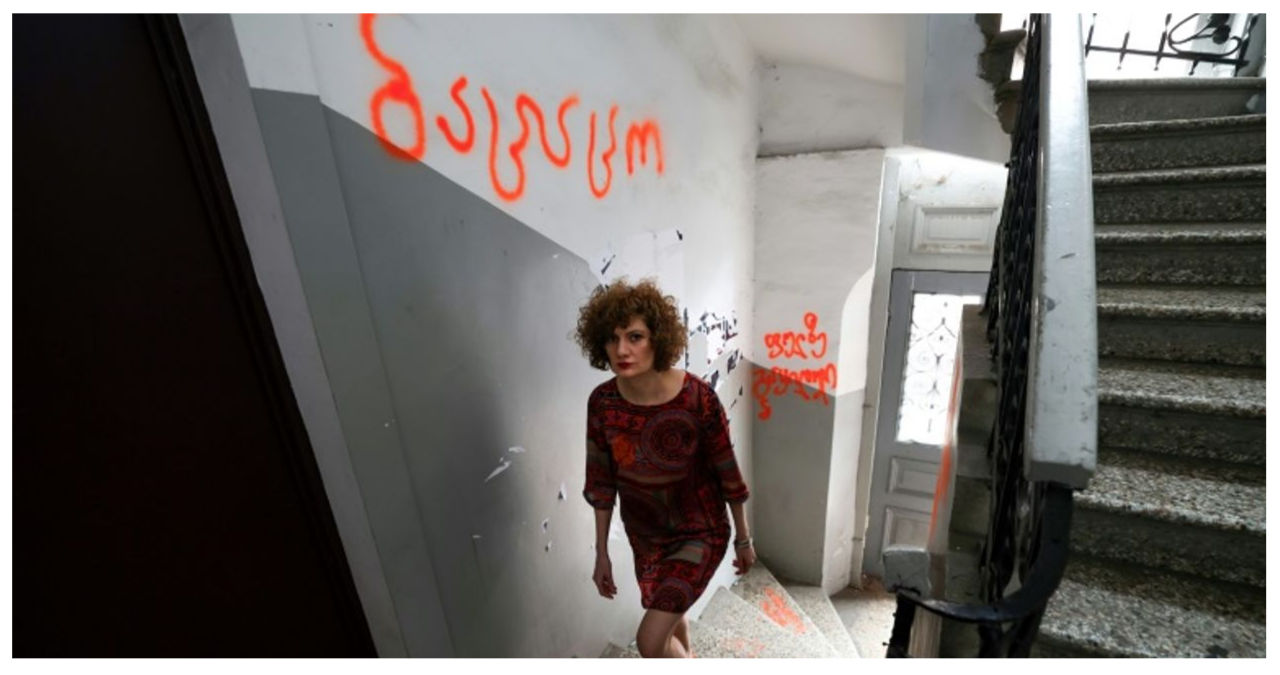Baia Pataraia, the head of a prominent women’s rights organization in Georgia, was startled when she woke up last weekend to discover that her apartment building in the capital city of Tbilisi had been covered in posters featuring her face and the phrase “foreign agent.”
Orange graffiti sprayed the words “grant-eating lesbian” on the staircase leading to her front door, where the images were also affixed.
“It was such an amazing feeling when my neighbors took them down,” Pataraia exclaimed.
Activists, independent journalists, and opposition politicians have been experiencing a wave of violence and threats for several weeks now. This alarming situation arose after the government of the former Soviet republic introduced draft legislation last month that specifically targeted NGOs.
The government argues that the law aims to ensure “transparency” by targeting foreign-funded groups like Pataraia’s that allegedly undermine Georgia’s sovereignty.
However, human rights observers and Western governments caution that this move will have negative consequences for Tbilisi’s progress towards joining the European Union. Moreover, it is feared that this decision will exacerbate the existing tensions in the Caucasus country, which has experienced significant division since gaining independence from the USSR in 1991.
Pataraia dismissed the notion that she posed a threat. Her organization, Sapari, provides assistance to women who are victims of domestic violence and facing discrimination.
She expressed her unwavering devotion to her people and country, emphasizing that everything she does is solely for their benefit and not for anyone else.
According to Pataraia, the government had been intensifying its control over NGOs and launching a media campaign against them for several months leading up to the adoption of the law on Tuesday.
However, organizations like Pataraia’s NGO continue to show resilience and determination.
“I will never, ever register as a foreign agent,” she emphatically stated to AFP.
– ‘Traitor’ posters –
The bill, commonly referred to as the “Russian law” due to its resemblance to oppressive legislation initially enacted by the Kremlin, ignited a series of massive protests that lasted for weeks.
If this policy is put into action, any organization or media group that receives at least 20% of its funding from foreign sources would be required to register as an agent of “foreign influence”.
Pataraia had previously been the target of similar posters. Last year, when the ruling Georgian Dream party attempted to pass the legislation, her face along with the word “traitor” was displayed on posters in various Tbilisi metro stations.
She stated that this was the first instance they had visited our homes.
Failure to register with the authorities would result in facing hefty fines or even the possibility of closure.
Similar posters were found outside the Georgian headquarters of Transparency International, an anti-corruption NGO, issuing threats towards Eka Gigauri, the organization’s local head.
Gigauri, who has been a vocal critic of the Georgian government, wasn’t surprised by the situation.
The 46-year-old expressed concern about the possibility of their assets being frozen.
Transparency International has been operating in Georgia for 24 years, just like many other Western-funded organizations that emerged after Tbilisi gained independence.
Gigauri firmly expressed that the group faced targeted attacks due to their reports on corruption in Georgia. She adamantly stated that she would never consent to being labeled as an agent or spy.
– We could ‘cease to exist’ –
Foreign-funded NGOs have played a crucial role in supporting various humanitarian causes, although the focus of the bill seems to be primarily on targeting rights monitors.
Nato Shavkaladze, located on the outskirts of Tbilisi, was deeply concerned about the future of her safe house for women seeking refuge from domestic violence. She reflected on the potential challenges her shelter might face if the law were to be enforced.
As she walked through the unassuming building that provides shelter for approximately 20 women, she revealed to AFP that one floor had undergone renovations funded by the Polish embassy, while another had been financed by Japan.
“In the kitchen of the shelter, she proudly mentioned that this fridge had been donated by Israel. Additionally, she mentioned that the shelter had received grants from Estonia.”
As she spoke, the room buzzed with the joyful energy of toddlers running around, while a peaceful baby peacefully slept in the front room.
Shavkaladze emphasized the importance of saving lives during our conversation.
Georgia’s NGO network relies heavily on foreign grants, with only 20 percent of its funding originating domestically.
Shavkaladze emphasized the importance of registration, stating, “Ceasing to exist is a likely outcome if we fail to register.”
Sara Modzmanashvili-Kemecsei faced a challenge in ensuring the continued operation of her dog shelter in Tbilisi.
“We are being labeled for taking actions that benefit the entire society,” she expressed.
Accompanied by her teenage daughter, she brought along boxes of donations, demonstrating her active involvement in the protests.
She emphasized that this is not merely about transparency.
When questioned about Bidzina Ivanishvili, the billionaire supporter of Georgian Dream, accusing NGOs of planning a revolution, she responded with a bold statement. “I would love for him to join me in shoveling dog poop and witness firsthand the hard work we are putting in to bring about change in the government.”



